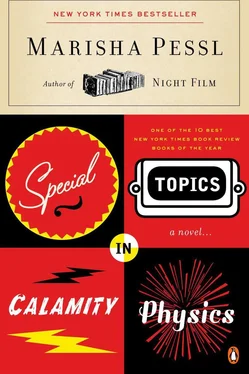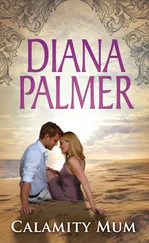Dad didn’t like to talk about that.
“That very morning your mother had talked to me of plans to enroll in a night class, Intro to Moths of North America, so rid yourself of such dour thoughts. Natasha was the victim of one too many butterfly nights.” Dad gazed at the floor. “A sort of moth moon madness,” he added quietly.
He smiled then and looked back at me, where I was standing in the door, but his eyes were heavy, as if it required strength to hold them to my face.
“We’ll leave it at that,” he said.
A Portrait of the Artist as a Young Man
We traveled.
Due to the surprisingly high sales of The Powers That Be (compared to the other page-turners published by Harvard University Press that year, including Currency Abroad [Toney, 1987] and FDR and His Big Deal: A New Look at the First100Days [Robbe, 1987]), his impeccable twelve-page curriculum vitae, the frequent appearance of his essays in such respected, highly specialized (yet little-read) journals as International Affairs and American Policies and Daniel Hewitt’s Federal Forum (not to mention a nomination in 1990 for the heralded Johann D. Stuart Prize for American Political Science Scholarship), Dad had managed to make enough of a name for himself to be a perennial visiting lecturer at political science departments across the country.
Mind you, Dad no longer wooed top-tiered universities for their esteemed multinamed teaching positions: the Eliza Grey Peastone-Parkinson Professor of Government at Princeton, the Louisa May Holmo-Gilsendanner Professor of International Politics at MIT. (I assumed, given the extreme competition, these institutions weren’t mourning Dad’s absence from their “tight-knit circle of incest”—what he called highbrow academia.)
No, Dad was now interested in bringing his erudition, international fieldwork experience and research to the bottom tiers (“bottom- feeders ,” he called them in a Bourbon Mood), the schools no one had ever heard of, sometimes not even the students enrolled in them: the Cheswick Colleges, the Dodson-Miner Colleges, the Hattiesburg Colleges of Arts and Sciences and the Hicksburg State Colleges, the universities of Idaho and Oklahoma and Alabama at Runic, at Stanley, at Monterey, at Flitch, at Parkland, at Picayune, at Petal.
“Why should I waste my time teaching puffed-up teenagers whose minds are curdled by arrogance and materialism? No, I shall spend my energies enlightening America’s unassuming and ordinary. ‘There’s majesty in no one but the Common Man.’” (When questioned by colleagues as to why he no longer wished to educate the Ivy League, Dad adored waxing poetic on the Common Man. And yet, sometimes in private, particularly while grading a frighteningly flawed final exam or widely-off-the-mark research paper, even the illustrious, unspoiled Common Man could become, in Dad’s eyes, a “half-wit,” a “nimrod,” a “monstrous misuse of matter.”)
An excerpt from Dad’s personal University of Arkansas at Wilsonville Web page (www.uaw.edu/polisci/vanmeer):
Dr. Gareth van Meer (Ph.D. Harvard University, 1978) is the Visiting Professor of Political Science for the 1997–1998 school year. He hails from Ole Miss, where he is Chair of the Department of Political Science and Director of the Center for the Study of the United States. He is interested, broadly, in political and economic revitalization, military and humanitarian involvement, and post-conflict renewal of Third World nations. He is currently working on a book entitled The Iron Grip, about African and South American ethnic politics and civil war.
Dad was always hailing from somewhere, usually Ole Miss, though we never went back to Oxford in the ten years we traveled. He was also always “currently working on The Iron Grip ,” though I knew as well as he did that the Grip —fifty-five legal pads filled with unintelligible handwriting (much of it water damaged), stored in a large cardboard box labeled in black permanent marker, GRIP — had not been worked on, currently or otherwise, in the last fifteen years.
“America,” Dad sighed as he drove the blue Volvo station wagon across another state line. Welcome to Florida, the Sunshine State. I flipped down the visor so I wasn’t blinded. “Nothing like this country. No indeedy-o. Really is the Promised Land. Land of the Free and the Brave. Now how about that Sonnet number 30? You didn’t finish. ‘When to the sessions of sweet silent thought / I summon up remembrance of things past.’ Come on, I know you know this one. Speak up. ‘And with old woes…’”
From second grade at Wadsworth Elementary in Wadsworth, Kentucky, until my senior year of high school at the St. Gallway School in Stockton, North Carolina, I spent as much time in the blue Volvo as I did in a classroom. Although Dad always maintained an elaborate explanation for our itinerant existence (see below), I secretly imagined we wandered the country because he was fleeing my mother’s ghost, or else he was looking for it in every rented two-bedroom house with a grouchy porch swing, every diner serving waffles tasting of sponge, every motel with pancake pillows, bald carpeting and TVs with a broken CONTRAST button so newscasters resembled Oompa Loompas.
Dad, on Childrearing: “There’s no education superior to travel. Think of The Motorcycle Diaries , or what Montrose St. Millet wrote in Ages of Exploration : ‘To be still is to be stupid. To be stupid is to die.’ And so we shall live. Every Betsy sitting next to you in a classroom will only know Maple Street on which sits her boxy white house, inside of which whimper her boxy white parents. After your travels, you’ll know Maple Street, sure, but also wilderness and ruins, carnivals and the moon. You’ll know the man sitting on an apple crate outside a gas station in Cheerless, Texas, who lost his legs in Vietnam, the woman in the tollbooth outside of Dismal, Delaware, in possession of six children, a husband with black lung but no teeth. When a teacher asks the class to interpret Paradise Lost , no one will be able to grab your coattails, sweet, for you will be flying far, far out in front of them all. For them, you will be a speck somewhere above the horizon. And thus, when you’re ultimately set loose upon the world…” He shrugged, his smile lazy as an old dog. “I suspect you’ll have no choice but to go down in history.”
Typically, our year was divided between three towns, September though December in one, January through June in another, July through August in a third, though occasionally this increased to a maximum of five towns in the span of one year, at the end of which I threatened to start sporting a burdensome amount of black eyeliner and baggy clothing. (Dad decided we’d return to the median number of three towns per year.)
Driving with Dad wasn’t cathartic, mind-freeing driving (see On the Road , Kerouac, 1957). It was mind-taxing driving. It was Sonnet-a-thons. It was One Hundred Miles of Solitude: Attempting to Memorize The Waste Land . Dad could meticulously divide a state end to end, not into equal driving shifts but into rigid half-hour segments of Vocabulary Flash Cards (words every genius should know), Author Analogies (“the analogy is The Citadel of thought: the toughest way to condition unruly relationships”), Essay Recitation (followed by a twenty-minute question-and-answer period), War of the Words (Coleridge/Wordsworth face-offs), Sixty Minutes of an Impressive Novel (selections included The Great Gatsby [Fitzgerald, 1925] and The Sound and the Fury [Faulkner, 1929]), and The Van Meer Radio Theater Hour, featuring such plays as Mrs. Warren’s Profession (Shaw, 1894), The Importance of Being Earnest (Wilde, 1895) and various selections from Shakespeare’s oeuvre, including the late romances.
Читать дальше












